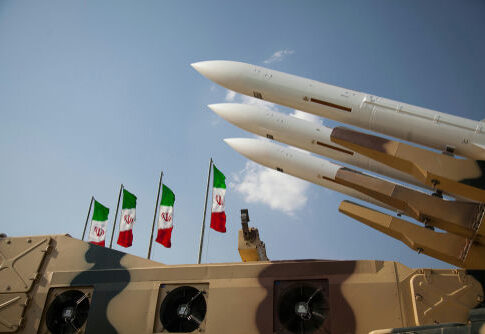The Iranian regime’s failure to address Tehran’s catastrophic water crisis now threatens the very existence of its capital city, exposing the consequences of decades of socialist mismanagement and government overreach.
Tehran Faces Collapse Following Water Crisis and Overpopulation
Iranian President Masoud Pezeshkian, subordinate to Ayatollah Ali Khamenei, has announced the necessity of relocating the nation’s capital away from Tehran. He cited an unsolvable water shortage and escalating overpopulation as the primary reasons for this drastic decision. Pezeshkian’s remarks, delivered on Thursday, acknowledged that “no solution exists” to preserve Tehran’s status as Iran’s capital. The city’s infrastructure is crumbling under the strain of meager rainfall, drying reservoirs, and a population estimated at nearly 10 million. The crisis highlights the fatal flaws of Iran’s centralized, government-controlled approach to resource management and urban planning.
Pezeshkian’s televised address detailed how rainfall in Tehran dropped to 140 millimeters last year—a 50 to 60 percent decrease from the standard 260 millimeters. This year is equally dire, with officials warning that the situation is “not a choice, it is a mandate.” The government’s mismanagement has left nineteen major dams operating at below 20 percent capacity, and the critical Amir Kabir reservoir near Tehran at just 6 percent of usable volume. These failures have triggered regional tensions, including a near-conflict with Afghanistan’s Taliban over shared water resources on the Helmand River. The Taliban threatened to “conquer” Iran in 2023 after a border shootout related to water access, underscoring how failed socialist policies breed instability and jeopardize millions.
Iran’s Socialist Mismanagement and Earthquake Risks Compound Crisis
Iranian officials have debated relocating the capital for decades, but Pezeshkian is now reviving the plan as an urgent project. In November, he told IRGC-linked engineering officials that “we have no choice but to build a new capital.” The Iranian Revolutionary Guard Corps (IRGC), designated as a terrorist organization by the U.S., is involved in these discussions, raising concerns about national security and further government overreach. Beyond the water crisis, Tehran faces grave earthquake risks—60% of the city’s buildings fail to meet earthquake safety standards, putting millions at risk. The recent Turkish earthquake, which killed over 50,000 due to poor enforcement of building regulations, serves as a stark warning for Iran’s future. Socialist, centralized control has failed to protect the public, and now the consequences are unavoidable.
Economic inefficiency is another factor driving the need to move the capital. Pezeshkian explained that transporting raw materials from the south to Tehran for processing, then exporting them back south, drains Iran’s competitive capacity. The imbalance between resources and expenditures in Tehran is unsustainable, and the president insists that shifting the economic and political center closer to the sea is now imperative. Despite these admissions, Iran’s leadership continues to prioritize ideological unity over practical reforms, exposing the flaws of centralized planning and government overreach.
International Sanctions and Internal Unrest Accelerate Iran’s Instability
The timing of Iran’s capital relocation plan coincides with renewed global sanctions. Last week, the United Nations reimposed sanctions due to Iran’s illicit nuclear development, restoring the pre-Obama nuclear deal regime. The International Atomic Energy Agency (IAEA) declared Iran in breach of international law for the first time in two decades. Inspectors found that Iranian authorities had “sanitized” key nuclear sites, obstructing accurate assessments of ongoing activities. These sanctions have sent Iran’s currency, the rial, to record lows and deepened economic turmoil.
Iranian officials have reacted aggressively, threatening “reciprocal responses” against countries upholding UN sanctions. Russia has already announced it will ignore these snapback measures. Pezeshkian maintains that Iran will preserve financial order, calling for national unity and faith in leadership. However, the regime’s repeated prioritization of pride, ideology, and centralized control over practical solutions continues to imperil the nation. For American conservatives, Iran’s crisis serves as a cautionary tale of what happens when government overreach, socialist policies, and disregard for constitutional principles replace common sense and effective governance.
Sources:
Tass: Iranian President Pezeshkian Cites Water Crisis as Reason to Relocate Capital
Iran International: Tehran Water Crisis Threatens 10 Million Residents
New York Times: Tehran’s Population and Water Emergency
Anadolu Agency: Why Iran Plans to Relocate Its Capital
Breitbart: Taliban Threatens Iran Over Water Dispute
Breitbart: Turkey-Syria Earthquake Death Toll
Iran International: President Repeats Call to Move Capital
Breitbart: UN Snapback Sanctions on Iran
Breitbart: IAEA Declares Iran Breach of Nuclear Obligations
Breitbart: Iran Threatens Countries Over UN Sanctions
PressTV: President Calls for Unity to Overcome Sanctions


This gives them a chance to go underground big time.